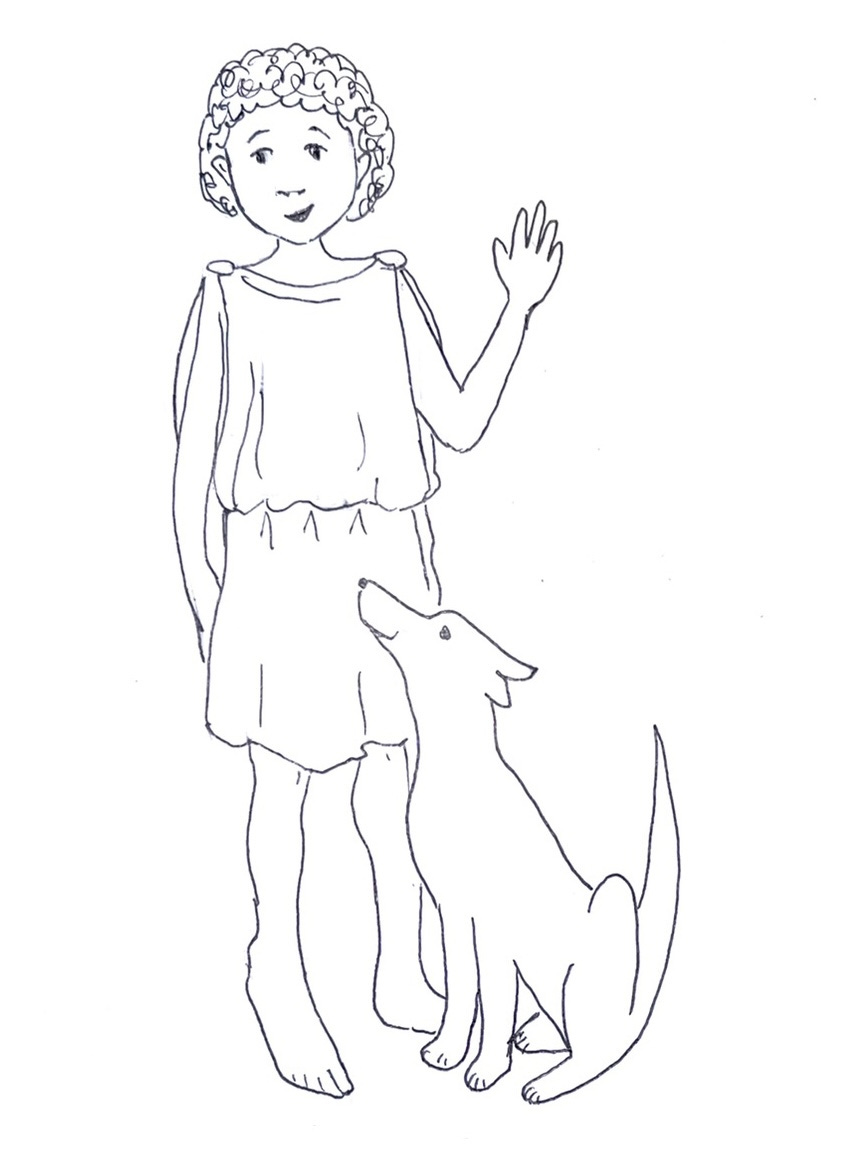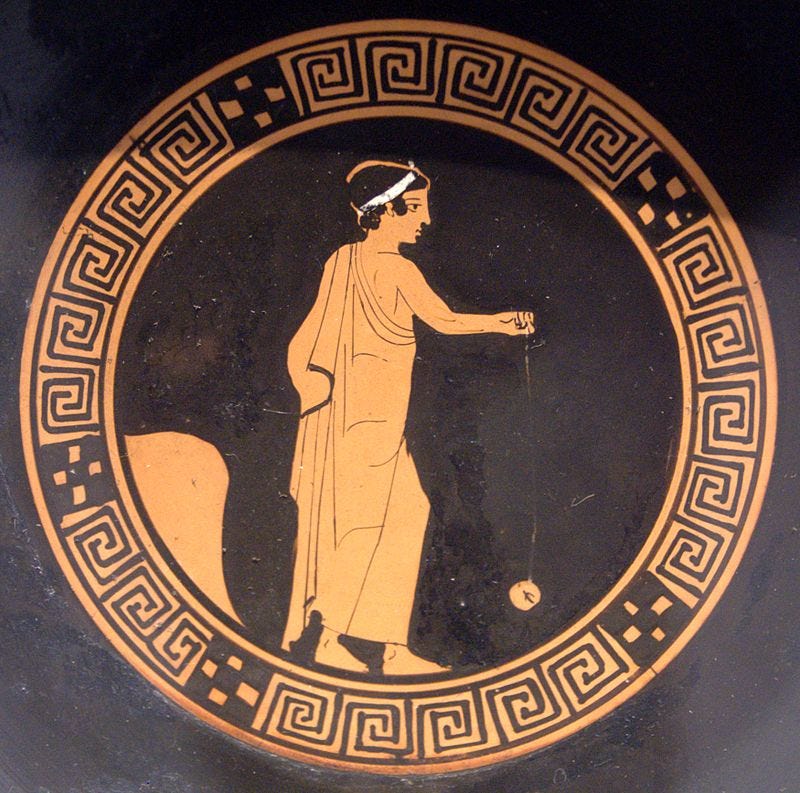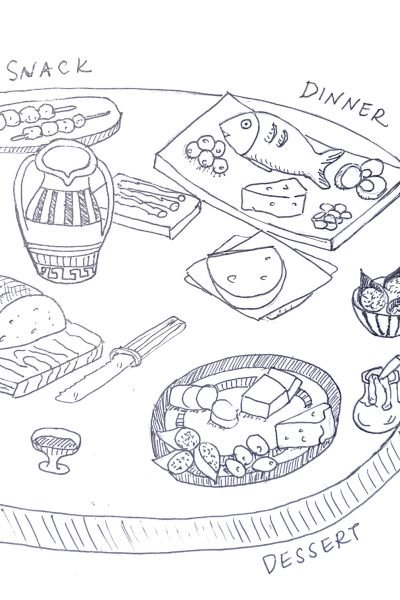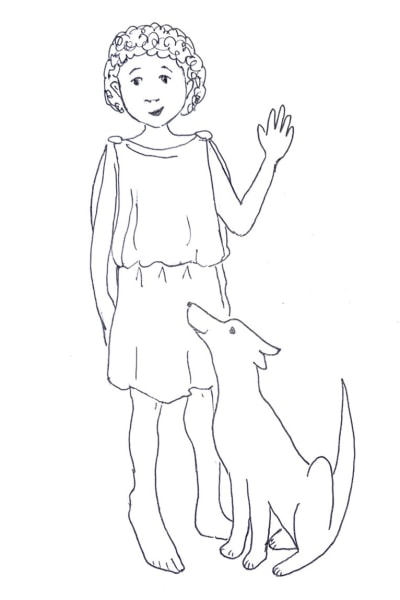Hello!
When folks think of the ancient world, they usually conjure up Alexander the Great, Socrates or Cleopatra. That’s because it’s usually the kings and queens, the daring battles and pontificating philosophers who grab the headlines.
However, the vast majority of ancient people had normal lives and daily routines just like us. They woke up, ate food, went to work or school, and went to bed...
So today, we are going to time travel 2,500 years to experience a normal day in the life of an average 8 year old Athenian boy.
Also, as a fun activity, we’ve included some ancient recipes, which we’ve tried out! It is a wonderful way to really experience a different culture, place or time period… but it can also be eye-opening that flavors aren’t always universal. Partly it’s because of what we are used to, to the types of ingredients we can get and how we can cook them.
For instance, many years ago our little family lived in Colombia, not far from the Amazonian jungle. We once ate at a restaurant where the chef would travel into the jungle and befriend the indigenous tribes, who would show him fruits and vegetables he had never seen or heard about. He would try to cook them according to what the tribes people said, but found that the indigenous palate was much more accustomed to more bitter flavors that we were. He then attempted to adapt it a bit. The end result was… interesting.
When we were eating the pancakes we made today, it certainly reminded me of that experience in Colombia. I’ll be honest, I enjoyed eating the pancakes more than anyone else in the family, but perhaps that’s because I regularly avoid salt and sugar anyways… so you may want to adapt the recipe, or keep it original to really ‘taste’ ancient daily life.
Read on below to discover Triton’s life and discuss what was the same, what was different... and what his food tasted like!
All the best,
Anya Leonard
Founder and Director
Classical Wisdom and Classical Wisdom Kids
P.S. We are still brand new, so please let us know what you like, what needs improvement and any ideas you might have! Also, if you want to support this new endeavor, you can become a Member today and choose one of our subscription plans here. If you can’t afford it, please email us here and we can help you out. You can also Donate a Subscription to those who can’t afford it, or Gift a Subscription to someone specifically here.
A Day in the Life of an eight-year-old boy in Ancient Athens
Meet Triton, an eight year old boy from a wealthy family. They are citizens of ancient Athens.
Triton’s day, just like any kid in Ancient Athens, starts early at dawn. Triton eats a simple breakfast, a porridge made out of barley or wheat.
While the men and women live in separate areas, Triton is looked after by his mother and a maid, who is a slave from far away. Today Triton is lucky! He sees his father at breakfast before he leaves for work at the assembly. Many times his father is gone for months to serve as a soldier in the Athenian army or as a rower in the navy.
Mostly Triton is with his mother, who manages the household. The family is large, and there are many relatives, servants and friends living under the same roof...Including Triton’s pet bird and his dog, named Achilles.
Triton only started school the year before. When he goes to class, the students sit around the teacher and write on waxen tablets. He studies poetry and math, but also gymnastics is important. Triton learns to wrestle and box, to prepare him for his future training as a soldier.
His family is wealthy enough to have a private tutor for him, who accompanies him to class.
Education is considered very important for boys but not for girls. As such, Triton’s sisters stay at home and help their mother. Boys from poorer families also do not go to school. They learn their father’s trade or work in jobs.
When Triton was born, his father hung a laurel wreath on his door to celebrate his birth. Triton is expected to excel so he can bring honor to his family. If he does not do well, or shows cowardice in sports, he brings shame to his family.
After school, Triton has some time for playing with other boys in the street.
Triton plays with toys that are still familiar today, such as tops and rattles. He also plays a ball game similar to basketball, but his ball is made of a pig bladder! Later he pretends to be a soldier and acts out when the Athenians beat the Spartans.
Now that it is dark, Triton is called home to eat. Even though his family is wealthy, he does not have any meat, as most families do not eat meat every day. Instead, he eats his soup, bread, and vegetables. Finally, a weary Triton goes to bed to rest for another busy day.
Discussion/Review:
What was Triton’s day like? What did he do?
What was similar about his day to yours? What was very different?
Why would Triton not have seen his father very often?
What sort of things did Triton study? What types of games or toys did he play with?
What is a Citizen? What makes a good citizen?
Do you think life would have been very different for a boy from a poor family? What would it be like for Triton’s sisters?
How can learning about daily life make us understand history better?
Activities:
Make a Meal! Enjoy a few of the attached recipes. See if you can prepare them yourselves.
Imagine Triton’s pet bird - draw on the page what you think it looked like.
Make a Venn diagram! What were the similarities and differences between Triton’s day and yours?
Write or tell a story: Imagine someone thousands of years from now was learning about the average day for a kid in the year 2023. What would you describe?
Download the PDF, which includes the Word Bank, Illustrations & Activities:
Go Further!
There were several ball games, such as Episkyros, and the one that was somewhat similar to basketball was called Passe-boule.
The Laurel, or Laurus nobilis, figures prominently in classical Greco-Roman culture, Bay laurel was used to fashion the laurel wreath of ancient Greece, a symbol of highest status. . The Roman naturalist Pliny the Elder listed a variety of conditions which laurel oil was supposed to treat: paralysis, spasms, sciatica, bruises, headaches, catarrhs, ear infections, and rheumatism.
Did you Know? The very popular ancient fish sauce, Garum, can still be found today! When the Romans traveled/battled up north in the British isles, their favorite sauce stayed and evolved into the commonly used Worcestershire sauce today.
Read the original text for the Pancakes!
'Let us find time to speak of other cakes, the ones made with wheat flour. Teganitai, as we call them, are made simply with oil. The oil is put in a frying-pan resting on a smokeless fire, and when it has heated, the wheat flour, mixed with plenty of water, is poured on. Rapidly, as it fries in the oil, it sets and thickens like fresh cheese setting in the baskets. And at this point the cooks turn it, putting the visible side under, next to the pan, and bringing the sufficiently fried side, which was underneath at first, up on to the top, and when the underneath is set they turn it again another two or maybe three times till they think it is all equally cooked. Some mix it with honey, and others again with sea-salt.'
– Galen, On the Properties of Foods 1, 3.
Slavery
Slavery is always a very difficult subject to talk about, but it’s really important to discuss. It is something we’ll discuss more in future lessons, but Slavery in the ancient world was different from more modern slavery. Many, if not most, slaves were not born slaves, but were captured in war or were in debt and sold. Anyone could become a slave! Rich and wealthy people, kings and philosophers as well as the poor... and slaves could be from any race, religion or region. Just as anyone could become a slave, there were also more opportunities to become free as well.
There are many famous slaves from the ancient world, including: Spartacus the famous gladiator, Aesop the fabulist, the Stoic philosopher Epictetus, the Cynic Philosopher Diogenes the Dog, Terence the playwright, the ancient Roman King Servius Tullius, Roman Bishop Pope Pius I and Pope Callixtus I and Senator Marcius Agrippa.
Slaves were very often from very far away places, regions in the ancient world that had been conquered by Greek or Roman forces. A common place for a slave to be from, for instance, was Scythia, an ancient area of Russia, or the Gauls and Celts in central and northern Europe.
If you would like to learn more about Slavery, you can watch this podcast here (Not specified for Children! For older kids/adults):









